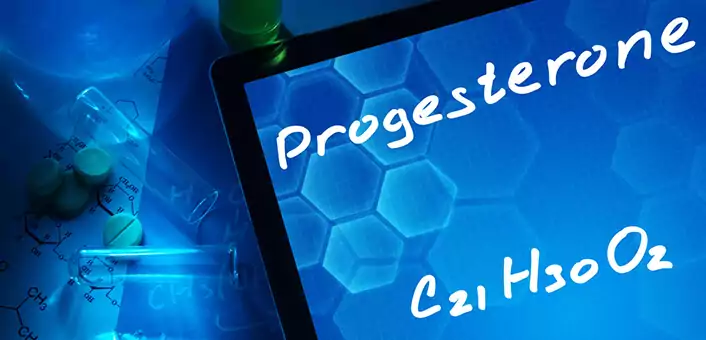
Drug Side Effects
Progesterone For PCOS: Know How It Works & Common Side Effects
Nov 16, 2017If there’s one defining chemical that differentiates women from men, it has to be progesterone. Progesterone is a hormone – a chemical messenger – that affects almost every tissue in the female body. In women with polycystic ovarian syndrome, or PCOS, progesterone levels are low. And this leads to a variety of problems including highly irregular periods and difficulty in getting pregnant.
Doctors often prescribe “natural” (the term is open to interpretation) or “bio-identical” (a glorified term for “synthetic,” to make it feel safe) hormones to regulate irregular periods. They mimic the changes that the woman undergoes naturally to become pregnant. The jury is still out on the efficacy and safety of these methods. But while “artificial” progesterone is very similar in structure to the natural molecule, it is not 100% similar. Sadly, even small changes can cause side effects and future health complications.
How Progesterone Therapy Helps Women With PCOS?
Progesterone is produced by the ovaries when ovulation (release of egg) occurs. Smaller amounts of progesterone are also produced by the adrenal glands. Progesterone and estrogen, the primary female hormone, have a delicate and complex relationship. But suffice to know that progesterone does the exact opposite of what estrogen does. Progesterone is vital for the woman to conceive as it prepares her body for pregnancy and also regulates her monthly period.
In PCOS, the hormonal balance of the female body is lost. And since the ovaries do not release eggs or release them sporadically, the progesterone levels are low. This could be due to a number of reasons – estrogen dominance, exposure to environmental mimics, insulin resistance, and many more. So while progesterone levels remain low in PCOS patients, the levels of estrogen and male hormones increase.
It, therefore, makes sense to increase levels of progesterone when the body needs it the most – in the latter half (luteal phase) of the menstrual cycle. If this can be achieved, periods will get regular and can also improve the chances of getting pregnant.
Side Effects Of Progesterone
Progesterone’s is given to PCOS patients in the form of two compounds – naturally-derived progesterone and artificially synthesized progestogen (or progestin). “Natural” progesterone is made from diosgenin, a compound that is found in a specific type of wild yam that grows in Mexico and also from soybeans. Diosgenin is altered chemically in the laboratory to produce progesterone. Progestogens are compounds that are structurally similar to natural progesterone. They can bind to progesterone receptors and show an activity similar to progesterone.
Side effects of progesterone will depend on the type of compound you are taking. Side effects of natural progesterone are dose-dependent. You will experience side effects if you use a higher than the recommended dosage.
Side effects of high progesterone levels include:
- Anxiety
- Bloating
- Fatigue
- Breast tenderness
- Loss of sexual drive
- Mood swings
- Vaginal dryness
- Acne
- Oily skin
- Urinary infections
- Weight gain
- Incontinence
- Hot flashes
Side effects of synthetic progestin include:
- Cardiovascular complications
- Blood clots
- Uterine and breast cancers
- Insomnia
- Irregular periods
- Depression
- Development of masculine features
- Tenderness in the breast
- Edema
- Fluid retention
- Liver problems
- Headaches or migraines
- Unexplained shortness of breath
- Loss of coordination
- Hyperglycemia (high blood sugar)-like symptoms (dry mouth, unusual thirst, frequent urination, loss of appetite)
Popular Brands of Progesterone/Progestins
Progesterone Cream:
- Emerita Pro-Gest
- Progestelle
- ProFeme
Progestin:
- Amen, Cycrin, Provera (Medroxyprogesterone acetate (MPA))
- Prometrium – pill; Prochieve 4% – gel (Micronized progesterone)
- Ovrette (Norgestrel)
- Micronor, Nor QD (Norethindrone)
- Aygestin (Norethindrone acetate)
Progesterone Pill Or Cream? Which One is Better?
Because your ovaries aren’t located in your digestive system, it makes more sense to provide them with progesterone where they would receive it easily. Like in the vagina. The vagina is supplied with a rich network of blood vessels that also connect the ovaries. So a progesterone or progestin cream applied inside the vagina has a better chance of being easily absorbed and be made available to the cells that need it the most.
Most progestin compounds are available as pills. When you pop a progestin pill, only 10% of the active compound actually reaches the target tissues. This means that you have to ingest around 500% more progestin than your body needs. Also, when this swallowed progestin enters your liver (after it has been made into chemical “mincemeat” by acids and enzymes in the stomach) more than 30 different kinds of metabolic by-products are created. All of these can have unwanted side effects.
How and When to Use Progesterone?
The best time to use progesterone cream is in the second half of your menstrual cycle. This is the time your body should be producing its own progesterone. Start using progesterone cream on Day 16 of your monthly cycle (the 16th day after your periods). Continue using the cream for the next 10-12 days and then stop.
You can use up to 20 mg of progesterone cream, twice daily. If you start seeing changes, such as a reduction in facial hair and acne as well as weight loss, it means the hormones are getting balanced and the therapy is working. This might take up to six months. Of course, with a healthy diet and exercise regimen, you will see results earlier. With regular use of progesterone cream, you can regulate PCOS symptoms, such as irregular periods.
Is Progesterone Safe in the Long Term?
Contrary to popular perception, “sex” hormones act on many tissues in the body. That’s because the cells in these tissues have complementary receptors for these hormones. Long-term progestin therapy adversely affects the brain.
If reports from the National Institutes of Health (NIH) are to be believed, progestin treatment for PCOS may reduce your chances of getting pregnant. Research at NIH shows that women treated with progestin were four times less likely to conceive.
Safety and Precautions for Using Progesterone
Tell your doctor if you are allergic to progesterone or any kind of progestin. Also, inform your doctor if you have any other kinds of allergies. Inform your doctor if you are taking any other prescription medicine, herbal supplements or plan to take them in the future. You should take caution while starting progesterone/progestin therapy if you have had any of the following medical conditions:
- Unexplained vaginal bleeding between periods
- Cancer of breasts or any female organ
- Seizures
- Migraines
- Asthma
- Diabetes
- Stroke
- Depression
- Blood clots anywhere in the body
- Vision problems
- Disease of the heart, liver, kidney or gallbladder
Tell your doctor if you are pregnant, plan to get pregnant or are breastfeeding. If you become pregnant during the therapy, call your doctor.
Progesterone may make you dizzy and drowsy. You shouldn’t be driving or operating heavy machinery until you get comfortable with the effects of this therapy on your body.
Does Progesterone’s Interact With Other Drugs?
Progesterone’s/progestin interacts severely with edoxaban. This drug is used for preventing serious blood clots due to a condition called atrial fibrillation. Progesterone’s may increase blood levels of edoxaban and increase the risk of life-threatening bleeding complications.
Vvenetoclax is another drug that interacts severely with progesterone/progestin. Vvenetoclax is a chemotherapeutic agent used to treat chronic lymphocytic leukemia, a type of cancer. When used together with progesterone’s, it could lead to a condition called tumor lysis syndrome. This syndrome can lead to kidney failure and even death due to a rapid breakdown of tumor cells.
Moderate interactions are seen with drugs like acarbose, acetaminophen, amoxicillin, aspirin, atropine, conjugated estrogens, clotrimazole, erythromycin, fluconazole, insulin, etc. You should always consult with your doctor about taking prescription or OTC drugs while on progesterone therapy.
Storage and Disposal of Progesterone’s
Store the medicine in a clean, dry and tightly closed container. Keep it away from humidity, excess light and heat. Do not refrigerate.
Always store medicines away from young children and pets. Unused and expired medicines should be disposed of in ways that they do not get consumed by pets, children and other people. Never flush the medicines. If you are not sure about the disposal of the medicine, take it back to your pharmacist.
Progesterone’s for PCOS: The Final Verdict
PCOS treatment entails a holistic approach that includes diet and lifestyle. Progesterone’s therapy is a small part of this approach. If you simply take this hormone and ignore diet and lifestyle changes, you will be sorely disappointed. Remember that your body has a natural way of creating and utilizing hormones. If you are introducing hormones externally, your body will respond in a variety of ways all of which might not be good for you.
Symptomatic treatment of PCOS is not the way to deal with this complex condition. The only solution to deal with it is to understand the underlying cause and strike at the root.
Don’t wish to deal with the side effects that come along with the drugs prescribed for PCOD management? Reverse PCOD naturally using a holistic approach with Sepalika’s 5-Petal PCOD Programme. Our personalized protocols help treat PCOD at the root through diet, nutrition, exercise, Ayurveda, and magnet acutherapy. What’s more, expert consults via phone and WhatsApp help you always stay on track in your journey to overcome PCOD. Click here to know more.





